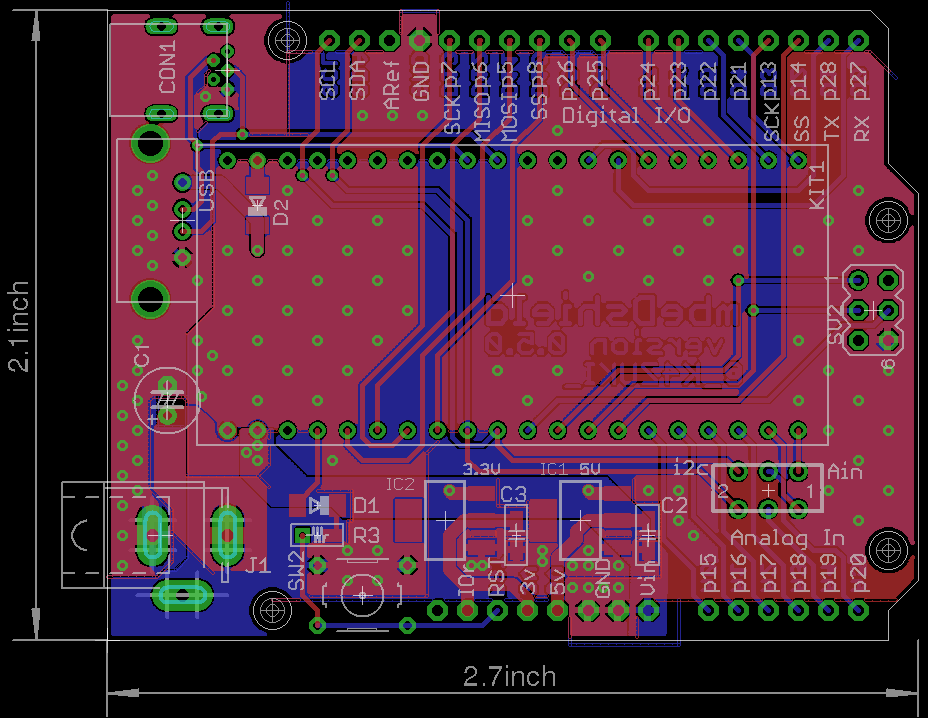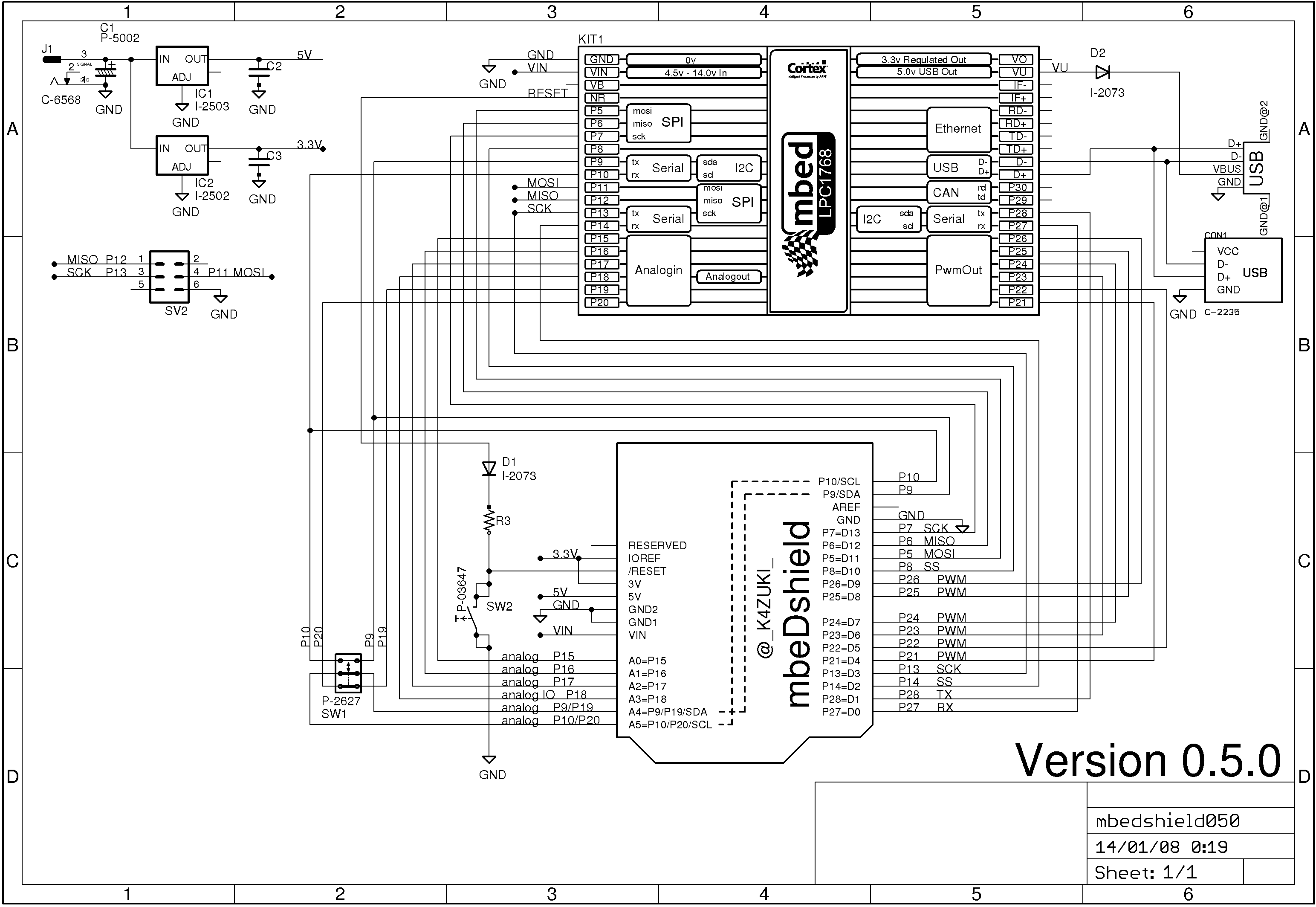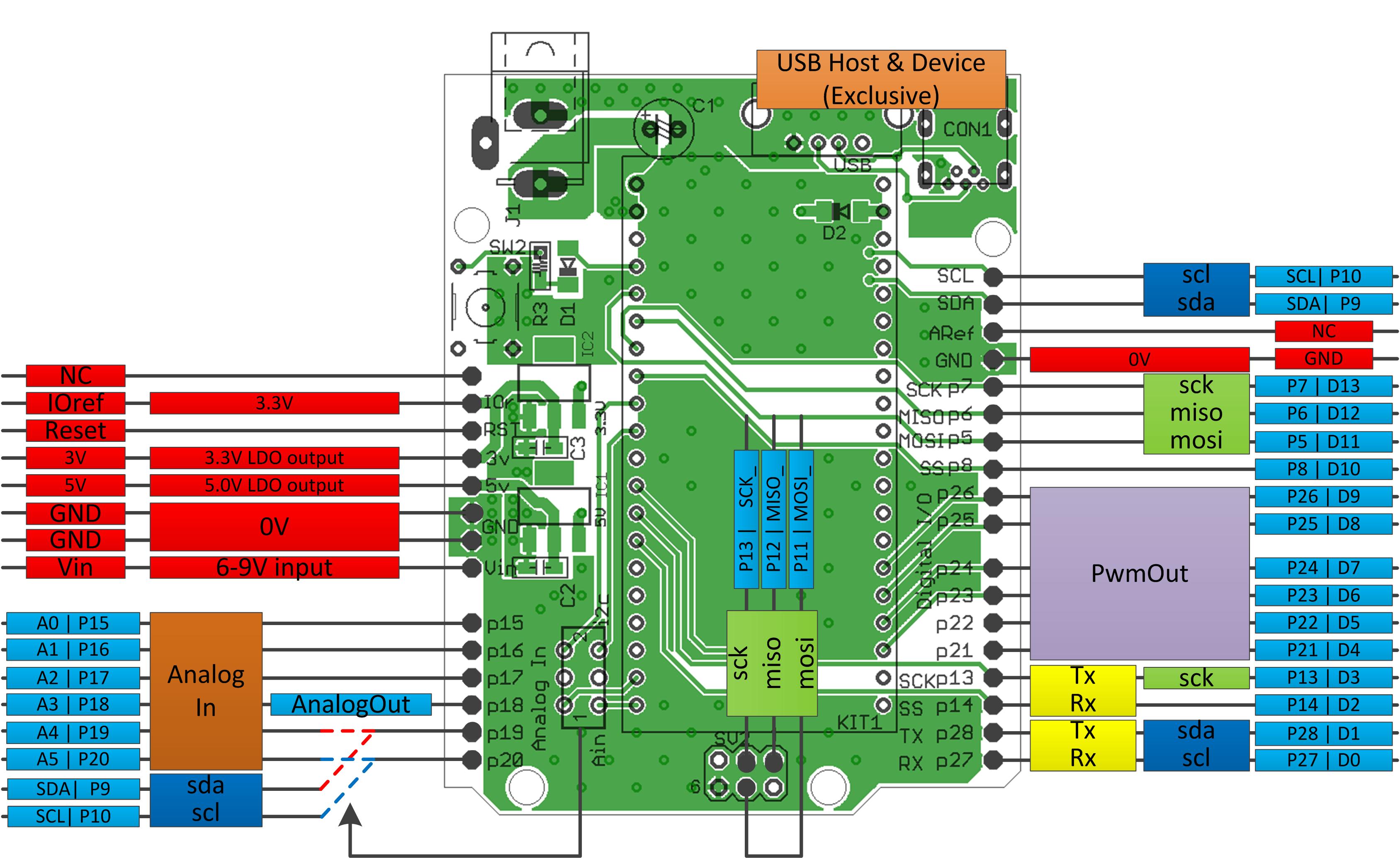The official mbed C/C SDK provides the software platform and libraries to build your applications.
Fork of mbed by
(01.May.2014) started sales! http://www.switch-science.com/catalog/1717/
(13.March.2014) updated to 0.5.0
This is a pin conversion PCB from mbed 1768/11U24 to arduino UNO.
- So if you have both mbed and arduino shields, I guess you would be happy with such a conversion board :)
Photos
- Board photo vvv

- Schematic photo vvv

- Functionality photo vvv

Latest eagle files
PCB >> /media/uploads/k4zuki/mbedshield050.brd
SCH >> /media/uploads/k4zuki/mbedshield050.sch
BIG changes from previous version
- Ethernet RJ45 connector is removed.
- http://mbed.org/components/Seeed-Ethernet-Shield-V20/ is the biggest hint to use Ethernet!
MostALL of components can be bought at Akizuki http://akizukidenshi.com/- But sorry, they do not send parts to abroad
- Pinout is changed!
| arduino | 0.4.0 | 0.5.0 |
|---|---|---|
| D4 | p12 | p21 |
| D5 | p11 | p22 |
| MOSI_ | none | p11 |
| MISO_ | none | p12 |
| SCK_ | none | p13 |
This design has bug(s)
- I2C functional pin differs between 1768 and 11U24.
Fixed bugs here
- MiniUSB cable cannot be connected on mbed if you solder high-height electrolytic capacitor on C3.
- http://akizukidenshi.com/catalog/g/gP-05002/ is the solution to make this 100% AKIZUKI parts!
- the 6-pin ISP port is not inprimented in version 0.4.0
it will be fixed in later version 0.4.1/0.4.2/0.5.0This has beenfixed
I am doing some porting to use existing arduino shields but it may faster if you do it by yourself...
you can use arduino PinName "A0-A5,D0-D13" plus backside SPI port for easier porting.
To do this you have to edit PinName enum in
- "mbed/TARGET_LPC1768/PinNames.h" or
- "mbed/TARGET_LPC11U24/PinNames.h" as per your target mbed.
here is the actual list: This list includes define switch to switch pin assignment
part_of_PinNames.h
USBTX = P0_2,
USBRX = P0_3,
//from here mbeDshield mod
D0=p27,
D1=p28,
D2=p14,
D3=p13,
#ifdef MBEDSHIELD_050
MOSI_=p11,
MISO_=p12,
SCK_=p13,
D4=p21,
D5=p22,
#else
D4=p12,
D5=p11,
#endif
D6=p23,
D7=p24,
D8=p25,
D9=p26,
D10=p8,
D11=p5,
D12=p6,
D13=p7,
A0=p15,
A1=p16,
A2=p17,
A3=p18,
A4=p19,
A5=p20,
SDA=p9,
SCL=p10,
//mbeDshield mod ends here
// Not connected
NC = (int)0xFFFFFFFF
Diff: PwmOut.h
- Revision:
- 43:e2ed12d17f06
- Parent:
- 27:7110ebee3484
- Child:
- 44:24d45a770a51
--- a/PwmOut.h Wed Aug 29 12:44:47 2012 +0100
+++ b/PwmOut.h Fri Oct 26 17:40:46 2012 +0100
@@ -16,26 +16,28 @@
namespace mbed {
-/* Class: PwmOut
- * A pulse-width modulation digital output
+/** A pulse-width modulation digital output
*
* Example
- * > // Fade a led on.
- * > #include "mbed.h"
- * >
- * > PwmOut led(LED1);
- * >
- * > int main() {
- * > while(1) {
- * > led = led + 0.01;
- * > wait(0.2);
- * > if(led == 1.0) {
- * > led = 0;
- * > }
- * > }
- * > }
+ * @code
+ * // Fade a led on.
+ * #include "mbed.h"
*
- * Note that on the LPC1768 and LPC2368, the PWMs all share the same
+ * PwmOut led(LED1);
+ *
+ * int main() {
+ * while(1) {
+ * led = led + 0.01;
+ * wait(0.2);
+ * if(led == 1.0) {
+ * led = 0;
+ * }
+ * }
+ * }
+ * @endcode
+ *
+ * @note
+ * On the LPC1768 and LPC2368, the PWMs all share the same
* period - if you change the period for one, you change it for all.
* Although routines that change the period maintain the duty cycle
* for its PWM, all other PWMs will require their duty cycle to be
@@ -45,87 +47,68 @@
public:
- /* Constructor: PwmOut
- * Create a PwmOut connected to the specified pin
+ /** Create a PwmOut connected to the specified pin
*
- * Variables:
- * pin - PwmOut pin to connect to
+ * @param pin PwmOut pin to connect to
*/
PwmOut(PinName pin, const char *name = NULL);
- /* Function: write
- * Set the ouput duty-cycle, specified as a percentage (float)
+ /** Set the ouput duty-cycle, specified as a percentage (float)
*
- * Variables:
- * value - A floating-point value representing the output duty-cycle,
+ * @param value A floating-point value representing the output duty-cycle,
* specified as a percentage. The value should lie between
* 0.0f (representing on 0%) and 1.0f (representing on 100%).
- * Values outside this range will be saturated to 0.0f or 1.0f.
+ * Values outside this range will be saturated to 0.0f or 1.0f.
*/
void write(float value);
- /* Function: read
- * Return the current output duty-cycle setting, measured as a percentage (float)
+ /** Return the current output duty-cycle setting, measured as a percentage (float)
*
- * Variables:
- * returns - A floating-point value representing the current duty-cycle being output on the pin,
+ * @returns
+ * A floating-point value representing the current duty-cycle being output on the pin,
* measured as a percentage. The returned value will lie between
* 0.0f (representing on 0%) and 1.0f (representing on 100%).
*
- * Note:
- * This value may not match exactly the value set by a previous <write>.
+ * @note
+ * This value may not match exactly the value set by a previous <write>.
*/
float read();
- /* Function: period
- * Set the PWM period, specified in seconds (float), keeping the
- * duty cycle the same.
+ /** Set the PWM period, specified in seconds (float), keeping the duty cycle the same.
*
- * Note:
- * The resolution is currently in microseconds; periods smaller than this
- * will be set to zero.
+ * @note
+ * The resolution is currently in microseconds; periods smaller than this
+ * will be set to zero.
*/
void period(float seconds);
- /* Function: period_ms
- * Set the PWM period, specified in milli-seconds (int), keeping the
- * duty cycle the same.
+ /** Set the PWM period, specified in milli-seconds (int), keeping the duty cycle the same.
*/
void period_ms(int ms);
- /* Function: period_us
- * Set the PWM period, specified in micro-seconds (int), keeping the
- * duty cycle the same.
+ /** Set the PWM period, specified in micro-seconds (int), keeping the duty cycle the same.
*/
void period_us(int us);
- /* Function: pulsewidth
- * Set the PWM pulsewidth, specified in seconds (float), keeping the
- * period the same.
+ /** Set the PWM pulsewidth, specified in seconds (float), keeping the period the same.
*/
void pulsewidth(float seconds);
- /* Function: pulsewidth_ms
- * Set the PWM pulsewidth, specified in milli-seconds (int), keeping
- * the period the same.
+ /** Set the PWM pulsewidth, specified in milli-seconds (int), keeping the period the same.
*/
void pulsewidth_ms(int ms);
- /* Function: pulsewidth_us
- * Set the PWM pulsewidth, specified in micro-seconds (int), keeping
- * the period the same.
+ /** Set the PWM pulsewidth, specified in micro-seconds (int), keeping the period the same.
*/
void pulsewidth_us(int us);
#ifdef MBED_OPERATORS
- /* Function: operator=
- * A operator shorthand for <write()>
+ /** A operator shorthand for write()
*/
PwmOut& operator= (float value);
PwmOut& operator= (PwmOut& rhs);
- /* Function: operator float()
- * An operator shorthand for <read()>
+ /** An operator shorthand for read()
*/
operator float();
#endif
